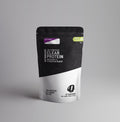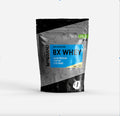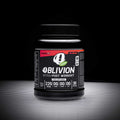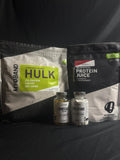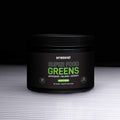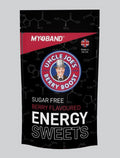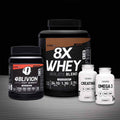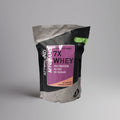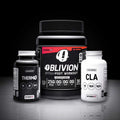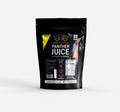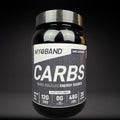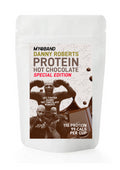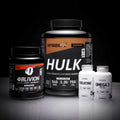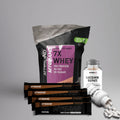Can nutritional supplements help to ease anxiety?
Posted by LIAM KINGSWELL

What exactly is anxiety?
Unfortunately, anxiety is extremely common and many people suffer with it.
In 2012 to 2015, data showed that 21.8% of women and 18.3% of men reported high levels of anxiety, rising to 37.1% in women and 22.9% in men in 2022/2023 (Office for National Statistics, 2017; Office for National Statistics, 2023). A lot of this is most likely due to COVID 19, however this anxiety has continued and it is important treat and if possible, avoid.
As many know, anxiety is associated with feelings of nervousness, stress, worry and always anticipating the worse. Physical symptoms such as sweating, increased heart rate and nausea can also occur while feeling anxious. In extreme cases of an anxiety attack, you can feel chest pains, have difficulty breathing, or even faint (Raypole, 2019). Anxiety can come from circumstantial events, epigenetic or genetic factors, it is different for everyone. The route cause involves disordered brain circuits, responding to trouble, sensing a threat (whether there is one or not) releasing adrenalin and large amounts cortisol, the stress hormone (Totten, et al., 2023).
Many prescription pharmaceutical products exist to treat anxiety. Drugs such as benzodiazepines, beta blockers and antidepressants are often prescribed for anxiety, with the number of these prescriptions continuing to rise (Archer, et al., 2022). However, many people just do not want to take prescription medication for their anxiety. Instead, many may be able to ease symptoms simply with diet and nutritional supplements. This is what we will look into.
What can minerals do to help?
Ensuring certain minerals are obtained either through diet or via supplements very much has the potential to ease anxiety. Supplements are a super easy and can be an inexpensive way of making sure you are getting these essential minerals. But which ones are supposed to help? And how do they help? Here are just some.
Zinc
Well let’s start with zinc. This is an essential trace mineral involved in taste, smell, supporting growth as well as cell division, immune function, gene expression and wound healing (Frassinetti, et al., 2006). The hypothalamus and cerebral cortex are the main areas of the brain where anxiety stems from and zinc regulates the neurotransmitters here (Huang, 1997). Lack of zinc therefore means things will not quite work right, causing anxiety. Low zinc levels are also associated with low gamma-aminobutyric acid, this is what blocks the signals in the brain from stress, and fear (anxiety), zinc supplements increase this, decreasing feelings of anxiety (Celentano, et al., 1991)
One study showed participants who had anxiety had lower levels of serum zinc than those who did not, when given zinc the anxiety was reduced (Tahmasebi, et al., 2017). Zinc supplements are therefore able to work as prevention as well as treatment for anxiety (Cope & Levenson, 2010).
Magnesium
Magnesium is also an essential mineral. It is involved in ATP fuelled reactions, production of nucleic acids and regulating muscle contraction and insulin release (Topf & Murray, 2003).
Changes in our central nervous system can be linked with magnesium deficiency, especially in the cerebral cortex, the area of the brain involved in our emotions (Redlich, et al., 2018). Deficiencies have also been shown to leave people more prone to chronic levels of cortisol (stress hormone), studies then showed decreased cortisol levels after magnesium supplementation (Dmitrašinović, et al., 2016).
The best results of supplementation of magnesium for helping with anxiety is when it is combined with other vitamins, particularly vitamin B6 (Lakhan & Vieira, 2010). One study showed two groups, one taking a supplement of magnesium and the another with B6 also added. The magnesium and B6 supplement showed that most affective at alleviating symptoms of anxiety (De Souza, et al., 2000).
If you combine magnesium, vitamin B6 and zinc, this can massively improve sleep cycles and improve mental health. This sort of supplement can be found in combined pills such as in the lab series at MYOBAND.
Calcium
Calcium works alongside magnesium to make sure our nervous system is working properly and so our brain provides us with the tools to avoid anxiety.
Making sure your intake of calcium is correct may improve mental health, given its role alongside magnesium in the central nervous system (Du, et al., 2022). Neurotransmitter synthesis is regulated by calcium, meaning it plays a role in mood regulation buy activation of certain neurons (Pal, 2021).
Low serotonin levels in the body are associated with anxiety. Calcium is also needed to produce serotonin, a precursor of melatonin, the hormone that helps you sleep (Nongonierma & FitzGerald, 2015). Without this, sleep cycles are disrupted, leading to sleep deprivation, and hindering emotional health (Barclay & Gregory, 2013). A combination of calcium and magnesium supplements would help with anxiety as well as helping to get proper sleep.
A combination of all the above in the form of a multivitamin was shown in one study to significantly decrease feelings of anxiety and stress compared to a group taking a placebo (Carroll, et al, 2000). So convenient supplement of all three would be beneficial for anxiety.
Iron
Iron is essential for red blood cell function, oxygen transport and optimum growth (Zeng, et al., 2014).
Iron deficiency is extremely common, particularly in children, adolescents, menstruating and pregnant women due to increased need for blood supply (Camaschella, 2019). Prolonged deficiency is classified as anaemia.
Iron is needed for the enzymes that make dopamine and serotonin to do their job (Youdim & Green, 1978). Dopamine is the hormone that creates the feeling of motivation and satisfaction you feel when you have achieved something. And as mentioned before, serotonin, helps you sleep. Certain enzymes that are required to regulated emotions and anxiety are seen to be much lower in those with iron deficient anaemia (Hill, 1985).
Supplementation of iron is therefore a good preventative measure of anxiety. Even when iron levels are low, this leads to feeling of tiredness and deflation, none of which are good for mental health.
Can vitamins play any role in anxiety?
Just like we have seen with minerals, it is important that we get the right amount of vitamins so our brains and bodies can work efficiently and help to avoid feelings of anxiety. There are a multitude of vitamins supplements and multivitamin supplements that make it super easy to incorporate into your life. So which ones will help with anxiety?
The B vitamins
B vitamins are a group of water-soluble vitamins found mainly in fruit and vegetables. They have been strongly linked with their ability to help improve mood, mainly due to their part in serotonin and dopamine production, of which are heavily involved in the avoidance of anxiety (Young, et al., 2019).
This is seen mostly with vitamins B6 (Pyridoxine), B9 (Folate) and B12 (Cobalamin). B6, as mentioned above, works alongside magnesium to improve brain function, and help to avoid and or reduce the feelings of anxiety. The most prominent symptoms of B6 deficiency are neurological, presenting as depression or general cognitive decline (Zempleni, 2013)
B9 and B12 are linked in that a B12 deficiency would lead to a B9 deficiency due to their complementary roles of each other. A B9 supplement would be redundant without sufficient B12 levels. B9 is involved in the process that turns amino acids into serotonin, melatonin, dopamine; hormones responsible for happiness, sleep, and feelings of satisfaction (Stahl, 2008). Many studies have shown a relationship between B9 and B12 deficiencies and impaired mood (Petridou, et al., 2016). Another, showed the effects of B12 deficiency and a general decline in cognitive performance (Morris, et al., 2012).
The B vitamins are linked with processes in the body responsible for the clearance of a hormone called homocysteine (Kennedy, 2016). Deficiencies would lead to an accumulation of homocysteine in the body (Otaegui-Arrazola, et, al., 2014). One study hypothesised that elevated levels of this hormone in the body are a risk factors for poor mood as 30% of low mood patient showed elevated levels (Bottiglieri, et al., 2000).
Rather than taking individual supplements for the B vitamins, it is best to have a multivitamin containing all of them. This means they can benefit from the combined positive effects they have on each other to best easy symptoms of anxiety or to prevent it all together. The ‘Vitamin B complex’ on the MYOBAND website is a good example of an inexpensive and convenient way to get all 8 of the B vitamins needed.
What about other vitamins? A, C, D and E?
These are different from the B vitamins in that they are fat soluble rather than water soluble.
There are many studies that show an association with vitamin D deficiency and symptoms of anxiety (Cheng, et al., 2020; Kaviani, et al., 2020). Its neuroprotective properties allow protection of brain tissues in regions responsible for mood allowing for avoidance of anxiety (Akpınar & Karadağ, 2022).
Vitamin C and E are both powerful antioxidants. Studies have shown that oxidative stress may be linked with anxiety, as those with low levels of antioxidants in their blood, showed symptoms (Maes, et al., 2000). Supplementation with antioxidants such as vitamin C and E have showed to have positive effects on those who suffer with anxiety due to increased antioxidant defence in their system (Gautam, et al., 2012).
This is also similar with vitamin A where supplementation of the antioxidant showed to significantly decrease symptoms and feelings of anxiety (Gautam, et al., 2012). Here antioxidant supplements can therefore be seen to also be able to ease the feelings of anxiety.
Certain multivitamins, such the one found in the lab series of MYOBAND, have all the vitamins as well as the addition of more antioxidants. Not only are these supplements good for your physical health, but they really could help ease feelings of anxiety and help to improve mental health.
Omega 3 fatty acid
Omega 3 polyunsaturated fatty acids are essential in that we cannot make these for ourselves, we must obtain them through our diet, particularly through fish and fish oils (Su, 2009). Many studies have now linked its importance to the treatment and development of anxiety. This can be seen in its anti-inflammation and anti-oxidation (another antioxidant!) properties as well as their role in the regulation of neurotransmitters, which as mention before has huge role in mental health (Su, 2008).
One study showed that omega 3 supplementation in a group of students with upcoming major exams resulted in a 20% decrease in symptoms in those struggling with anxiety (Kiecolt-Glaser, et al., 2011). Other biochemical studies have showed that omega 3’s increase the release of a product called fluid 5- HIIA which is commonly associated with the improvement of the symptoms of anxiety (Nizzo, et al., 1978).
Omega 3 supplements are well known to improve mood and help to prevent, as well as treat, anxiety. These often come in convenient capsules as seen in MYOBANDs lab series, making it super easy to incorporate them into the diet.
Do supplements have the potential to ease anxiety?
As discussed above, nutritional supplements appear to be able to ease symptoms of anxiety, as well as having the potential to prevent having to suffer in the first place.
For so many, taking prescription medication for phycological issues is daunting and simply do not want to do it. Some may have tried but found that the side effects outweigh the benefits of the medication. Common side effects such as dizziness, tiredness, nausea, and intestinal issues can become just too much to deal with in daily life. Many even see dramatic weight gain after starting anti-anxiety medication, which can lead to other issues such as problems with self-esteem.
There is a strong link between diet and mental health. Whilst it is easy to say to just eat a healthy and varied diet, in practice this can be very difficult for many people. Some simply just do not like certain foods that can provide large amounts of vitamins and minerals or struggle to incorporate certain foods into their diet. Supplements therefore can provide an easy way to ensure that pretty much all essential vitamins and minerals are consumed.
Anxiety is a horrible feeling that affects so many people. Having the tools to combat this in any way is essential. Many people may prefer to try easing their anxiety with nutritional supplements before starting to take prescribed medication. Supplements not only help to avoid and ease anxiety, but come with countless other health benefits that medication does not provide.
Understandably some extreme cases of anxiety can only be treated with medically prescribed medication. If at first you feel like you would like try and avoid this and try a more natural route, then nutritional supplements could help. Along with a varied diet and a moderately active lifestyle, they can provide your body with the tools to help ease the feelings of anxiety.
References
Akpınar, Ş., & Karadağ, M. G. (2022). Is Vitamin D Important in Anxiety or Depression? What Is the Truth?. Current Nutrition Reports, 1-7. https://doi.org/10.1007/s13668-022-00441-0
Archer, C., MacNeill, S. J., Mars, B., Turner, K., Kessler, D., & Wiles, N. (2022). Rise in prescribing for anxiety in UK primary care between 2003 and 2018: a population-based cohort study using Clinical Practice Research Datalink. British Journal of General Practice, 72(720), e511-e518. https://doi.org/10.3399/bjgp.2021.0561
Barclay, N. L., & Gregory, A. M. (2013). Quantitative genetic research on sleep: a review of normal sleep, sleep disturbances and associated emotional, behavioural, and health-related difficulties. Sleep medicine reviews, 17(1), 29-40. https://doi.org/10.1016/j.smrv.2012.01.008
Bottiglieri, T., Laundy, M., Crellin, R., Toone, B. K., Carney, M. W., & Reynolds, E. H. (2000). Homocysteine, folate, methylation, and monoamine metabolism in depression. Journal of neurology, neurosurgery & psychiatry, 69(2), 228-232. https://doi.org/10.1136/jnnp.69.2.228
Camaschella, C. (2019). Iron deficiency. Blood, The Journal of the American Society of Hematology, 133(1), 30-39. https://doi.org/10.1182/blood-2018-05-815944
Celentano, J. J., Gyenes, M. I. K. L. O. S., Gibbs, T. T., & Farb, D. H. (1991). Negative modulation of the gamma-aminobutyric acid response by extracellular zinc. Molecular Pharmacology, 40(5), 766-773.
Cheng, Y. C., Huang, Y. C., & Huang, W. L. (2020). The effect of vitamin D supplement on negative emotions: A systematic review and meta‐analysis. Depression and anxiety, 37(6), 549-564. https://doi.org/10.1002/da.23025
Cope, E. C., & Levenson, C. W. (2010). Role of zinc in the development and treatment of mood disorders. Current Opinion in Clinical Nutrition & Metabolic Care, 13(6), 685-689. https://doi.org/10.1097/MCO.0b013e32833df61a
De Souza, M. C., Walker, A. F., Robinson, P. A., & Bolland, K. (2000). A synergistic effect of a daily supplement for 1 month of 200 mg magnesium plus 50 mg vitamin B6 for the relief of anxiety-related premenstrual symptoms: a randomized, double-blind, crossover study. Journal of women's health & gender-based medicine, 9(2), 131-139. https://doi.org/10.1089/152460900318623
Dmitrašinović, G., Pešić, V., Stanić, D., Plećaš-Solarović, B., Dajak, M., & Ignjatović, S. (2016). ACTH, cortisol and IL-6 levels in athletes following magnesium supplementation. Journal of medical biochemistry, 35(4), 375. https://doi.org/10.1515/jomb-2016-0021
Du, C., Hsiao, P. Y., Ludy, M. J., & Tucker, R. M. (2022). Relationships between dairy and calcium intake and mental health measures of higher education students in the United States: outcomes from moderation analyses. Nutrients, 14(4), 775. https://doi.org/10.3390/nu14040775
Frassinetti, S., Bronzetti, G. L., Caltavuturo, L., Cini, M., & Della Croce, C. (20 06). The role of zinc in life: a review. Journal of environmental pathology, toxicology and oncology, 25(3). https://doi.org/10.1615/JEnvironPatholToxicolOncol.v25.i3.40
Gautam, M., Agrawal, M., Gautam, M., Sharma, P., Gautam, A. S., & Gautam, S. (2012). Role of antioxidants in generalised anxiety disorder and depression. Indian journal of psychiatry, 54(3), 244-247. https://doi.org/10.4103/0019-5545.102424
Hill, J. M. (1985). Iron concentration reduced in ventral pallidum, globus pallidus, and substantia nigra by GABA-transaminase inhibitor, gamma-vinyl GABA. Brain research, 342(1), 18-25. https://doi.org/10.1016/0006-8993(85)91348-4
Huang, E. P. (1997). Metal ions and synaptic transmission: think zinc. Proceedings of the National Academy of Sciences, 94(25), 13386-13387. https://doi.org/10.1073/pnas.94.25.13386
Kaviani, M., Nikooyeh, B., Zand, H., Yaghmaei, P., & Neyestani, T. R. (2020). Effects of vitamin D supplementation on depression and some involved neurotransmitters. Journal of affective disorders, 269, 28-35. https://doi.org/10.1016/j.jad.2020.03.029
Kennedy, D. O. (2016). B vitamins and the brain: mechanisms, dose and efficacy—a review. Nutrients, 8(2), 68. https://doi.org/10.3390/nu8020068
Kiecolt-Glaser, J. K., Belury, M. A., Andridge, R., Malarkey, W. B., & Glaser, R. (2011). Omega-3 supplementation lowers inflammation and anxiety in medical students: a randomized controlled trial. Brain, behavior, and immunity, 25(8), 1725-1734. https://doi.org/10.1016/j.bbi.2011.07.229
Lakhan, S. E., & Vieira, K. F. (2010). Nutritional and herbal supplements for anxiety and anxiety-related disorders: systematic review. Nutrition journal, 9, 1-14. https://doi.org/10.1186/1475-2891-9-42
Maes, M., De Vos, N., Pioli, R., Demedts, P., Wauters, A., Neels, H., & Christophe, A. (2000). Lower serum vitamin E concentrations in major depression: Another marker of lowered antioxidant defenses in that illness. Journal of affective disorders, 58(3), 241-246. https://doi.org/10.1016/S0165-0327(99)00121-4
Morris, M. S., Selhub, J., & Jacques, P. F. (2012). Vitamin B‐12 and folate status in relation to decline in scores on the Mini‐Mental State Examination in the Framingham Heart Study. Journal of the American Geriatrics Society, 60(8), 1457-1464. https://doi.org/10.1111/j.1532-5415.2012.04076.x
Nizzo, M. C., Tegos, S., Gallaminia, A., Toffano, G., Polleri, A., & Massarottib, M. (1978). Brain cortex phospholipids liposomes effects on CSF HVA, 5-HIAA and on prolactin and somatotropin secretion in man. Journal of Neural Transmission, 43, 93-102. https://doi.org/10.1007/BF01579068
Nongonierma, A. B., & FitzGerald, R. J. (2015). Milk proteins as a source of tryptophan-containing bioactive peptides. Food & function, 6(7), 2115-2127. https://doi.org/10.1039/C5FO00407A
Otaegui-Arrazola, A., Amiano, P., Elbusto, A., Urdaneta, E., & Martínez-Lage, P. (2014). Diet, cognition, and Alzheimer’s disease: food for thought. European journal of nutrition, 53, 1-23. https://doi.org/10.1007/s00394-013-0561-3
Pal, M. M. (2021). Glutamate: The master neurotransmitter and its implications in chronic stress and mood disorders. Frontiers in Human Neuroscience, 15, 722323. https://doi.org/10.3389/fnhum.2021.722323
Petridou, E. T., Kousoulis, A. A., Michelakos, T., Papathoma, P., Dessypris, N., Papadopoulos, F. C., & Stefanadis, C. (2016). Folate and B12 serum levels in association with depression in the aged: a systematic review and meta-analysis. Aging & mental health, 20(9), 965-973. https://doi.org/10.1080/13607863.2015.1049115
Public opinions and social trends, Great Britain: personal well-being and loneliness - Office for National Statistics. (2023, May). Www.ons.gov.uk. https://www.ons.gov.uk/peoplepopulationandcommunity/wellbeing/datasets/publicopinionsandsocialtrendsgreatbritainpersonalwellbeingandloneliness
Raypole, C. (2019, March 15). Physical Symptoms of Anxiety: How Does It Feel? Healthline; Healthline Media. https://www.healthline.com/health/physical-symptoms-of-anxiety
Redlich, R., Opel, N., Bürger, C., Dohm, K., Grotegerd, D., Förster, K., ... & Dannlowski, U. (2018). The limbic system in youth depression: brain structural and functional alterations in adolescent in-patients with severe depression. Neuropsychopharmacology, 43(3), 546-554. https://doi.org/10.1038/npp.2017.246
Stahl, S. M. (2008). L-methylfolate: a vitamin for your monoamines. J Clin Psychiatry, 69(9), 1352-1353. https://doi.org/10.4088/jcp.v69n0901
Su, K. P. (2008). Mind-body interface: the role of n-3 fatty acids in psychoneuroimmunology, somatic presentation, and medical illness comorbidity of depression. Asia Pacific Journal of Clinical Nutrition, 17.
Su, K. P. (2009). Biological mechanism of antidepressant effect of omega–3 fatty acids: how does fish oil act as a ‘mind-body interface’?. Neurosignals, 17(2), 144-152. https://doi.org/10.1159/000198167
Tahmasebi, K., Amani, R., Nazari, Z., Ahmadi, K., Moazzen, S., & Mostafavi, S. A. (2017). Association of mood disorders with serum zinc concentrations in adolescent female students. Biological trace element research, 178, 180-188. https://doi.org/10.1007/s12011-016-0917-7
Topf, J. M., & Murray, P. T. (2003). Hypomagnesemia and hypermagnesemia. Reviews in Endocrine and Metabolic Disorders, 4, 195-206. https://doi.org/10.1023/A:1022950321817
Totten, M. S., Davenport, T. S., Edwards, L. F., & Howell, J. M. (2023). Trace Minerals and Anxiety: A Review of Zinc, Copper, Iron, and Selenium. Dietetics, 2(1), 83-103. https://doi.org/10.3390/dietetics2010008
Youdim, M. B. H., & Green, A. R. (1978). Iron deficiency and neurotransmitter synthesis and function. Proceedings of the Nutrition Society, 37(2), 173-179. doi:10.1079/PNS19780022
Young, L. M., Pipingas, A., White, D. J., Gauci, S., & Scholey, A. (2019). A systematic review and meta-analysis of B vitamin supplementation on depressive symptoms, anxiety, and stress: Effects on healthy and ‘at-risk’individuals. Nutrients, 11(9), 2232. https://doi.org/10.3390/nu11092232
Zempleni, J., Suttie, J. W., Gregory III, J. F., & Stover, P. J. (Eds.). (2013). Handbook of vitamins. CRC Press.
Zeng, Y., Yang, J., Du, J., Pu, X., Yang, X., Yang, S., & Yang, T. (2014). Strategies of functional foods promote sleep in human being. Current signal transduction therapy, 9(3), 148-155. https://doi.org/10.2174/1574362410666150205165504TAGS:
